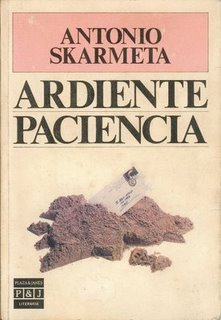
WITH BURNING PATIENCE (ARDIENTE PACIENCIA)
Chile, 1983, 80 minutes, Colour.
Robert Parada, Oscar Castro.
Directed by Antonio Skarmeta.
With Burning Patience is an excellent and rewarding film. A West German Portuguese co-production, it focuses on Chile in the early '70s. It shows the Nobel Prize poet Pablo Neruda in his home at Isla Nigra. (Neruda is portrayed by Robert Farada.)
It is also the story of his young postman, Mario, a wonderful performance by Oscar Castro. The two interact as Mario would like to be a poet and use poetry to win the hand of Beatrix, the daughter of the owner of the local inn - who is also opposed to the marriage. There are some delightful comic touches in the portrayal of the island people and their interactions.
However, there is a political background to the story as Neruda is involved in local elections, Allende wins the presidency and there is democracy in Chile. As the film moves towards its end, there are ominous signs with Fascists in the town, spies and troops. The film ends with the downfall of Allende, the rounding up of suspects including Mario.
By its delightful humour and its warm portrayal of human beings, the film entices its audience into the whole atmosphere of Chile. This makes the sombre ending all the more forceful. (Michael Radford's film, Il Postino, was a fictional account of the same story.)
1. An entertaining film? Interesting? Understanding of Chileans? Its acclaim?
2. The Portuguese-West? German perspective on Chile? A European view of South America? on the Hispanic and Indian traditions, Chilean life and culture, democracy, values? The comment on the Allende democracy and the downfall of that government? Its comment on the subsequent Pinochet regime?,
3. The brevity of its film, humanity, humour? Wit and pathos?
4. Location photography, the atmosphere of Isla Negra, the tom, the beauty of the coast, the sea, the beach? Its isolation and rugged beauty? The '60s and 1970s and the modern style? The musical score - and the enjoyable use of The Carpenters' Mr Postman?
5. A film of simplicity and complexity? The interaction of Marlo and Pablo Neruda? The local detail yet the universal appeal - and still a story of Chile?
6. Audience knowledge of Chilean history in the '60s and 1970s? Democracy, freedoms? Dictatorship? ordinary people, apolitical people, in such situations? Neruda and his literary achievement? Ambassadorship? Allende and his regime and its atmosphere? Democracy and elections, the buying of votes? The television warnings and incidents, the military, helicopters? Neruda's political role? Mario caught up An this atmosphere? The final freeze frame ? Audience emotional response and understanding? The title and the quotation from Rimbaud's poetry?
7. The portrait of Pablo Neruda? His status, achievement as a human being? Benigno, his home and his style, Mario as his postman, their friendship and chat, his having to tell Mario to stop chattering? His explanation of metaphors? Attractive, delighting An human nature, delighting in his home by the sea - and the human exasperation?
8. The build-up to the telegram about the Nobel Prize? His speech? His involvement in politics, his support of Allende? His service overseas, his work in Paris? The importance of his getting the tape recording of the sounds of the island? His skill with poems, writing for Mariv, the courting of Beatriz, the hostility of Rosa and her visit? His return home for the wedding? A portrait of a significant Chilean?
9. Mario as an engaging character, a personality, credible, delightful? His limited work as postman? His bike, the visit to the poet, his going, sharing interests and reflections, his thinking, his understanding of metaphors - and his own simple poetic gifts? His walking the beach, composing metaphors? The infatuation with Beatriz, meeting her at the inn, offering her metaphors? Rosa and the plea, her overhearing things? The courtship, Beatriz's seduction and its style - romantic, erotic, amusing? His support of Neruda, recording the sounds for him - a joyful task? The marriage, the exuberance and his son, the photographs? Happiness, the boy growing up? The festa and the dancing? The brewing of troubles, the cliff and Neruda, the sea, his arrest, the final freeze frame? An Everyman figure?
10. Beatriz and her beauty, working at the inn, attractive, the beach, her relationship to her mother, the discussions about metaphors, the sex and the egg, the marriage, the birth of the boy, the happy couple?
11. Rosa and her strictness, supervision, listening to the metaphors? The visit to Neruda and the sharpness towards him? The happiness of the wedding? Her work, accepting the situation?
12. The old postmaster and his friendship, the wedding, his help?
13. The sketch of the villagers and their lifestyle? The freedoms? The intrusion of more Fascist politics?
14. Themes of politics, democracy, Fascism, standover tactics, the buying of votes, the military?
15. The power of poetry and the beauty of metaphor? The title of the film? The quotation from Rimbaud and the splendid city?